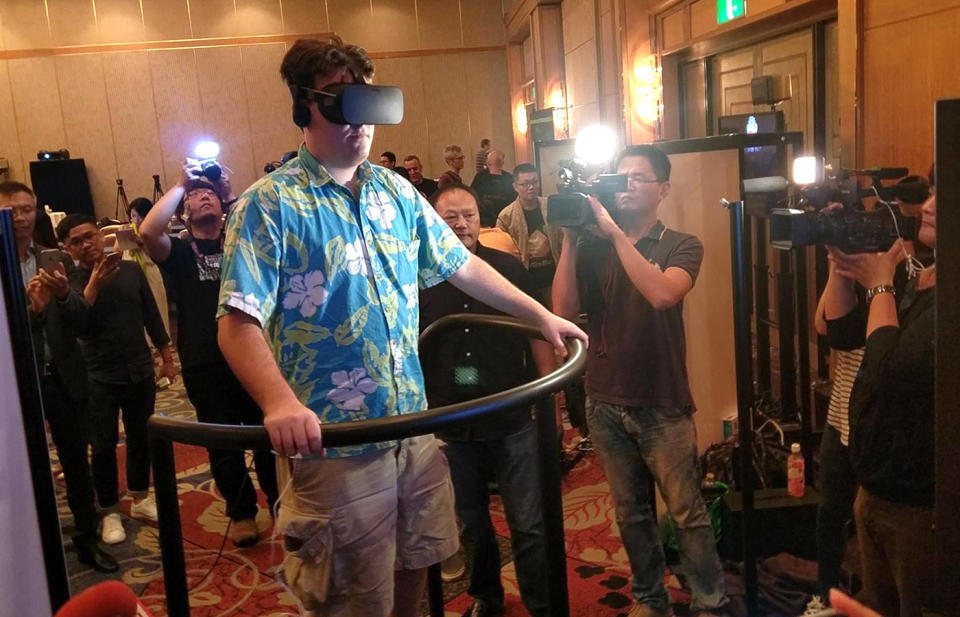Ex-HTC CEO hints at the future of VR headsets
We might see a wireless high-end VR system next year, according to the company's former chief.

For a man who spent 18 years at HTC turning smartphones from mere business tools into ubiquitous consumer gadgets, Peter Chou knows a thing or two about nurturing new product categories. In fact, he had already started his second chapter at the company by bringing us the Vive virtual reality headset before his quiet departure last August. Today, Chou's mission is extended by way of two chairman roles: one at visual effects studio Digital Domain, where he can "fully and deeply understand" VR content creation, and another at VR game studio Futuretown, where he is also an investor. Content development may seem like a weird match given Chou's prior focus on hardware, but to him it felt like a logical next step. After all, it's now content, not hardware, pushing VR forward.
Chou crossed paths with Futuretown while he was still developing the Vive. At the time, Chou wanted to extend HTC's resources to support small VR companies with great potential, so he tasked his team with a scouting mission. That led them to Futuretown, which happened to be located nearby. One day its CEO, Johan Yang, simply walked over to meet Chou for some guidance.
"They were worried at the time because they didn't really know where the market was, but I told them, every industry is like that," Chou told Engadget ahead of Futuretown's Tokyo Game Show press event. "At the beginning you can't really see the market and how great the market is, but if you have a vision, if you believe that is the future, then you should work on that and build capabilities in that area, and try to be the best."
Chou would later invest in Futuretown personally and then serve as a mentor under the "Honorary Chairman" title. This proved to be a smart move. The startup has already three VR games that have quickly risen to popularity. In particular, Cloudlands: VR Minigolf now owns 30 percent of the Vive market share, which translates to about 30,000 units out of the estimated total of 100,000. The game was also recently updated with a level editor along with more than 200 user-created levels from the earlier beta program. Furthermore, Futuretown will add Oculus Rift support to at least two of those games, and they are ready to launch as soon as the Oculus Touch controller arrives -- likely by end of year, as speculated by Yang.
Back in July, Chou returned to his hardware roots and announced Digital Domain's professional 4K 360-degree camera, the Zeus. Then, this week he unveiled Futuretown's first hardware product, the 5D Totalmotion modular simulator ride, in the hopes of making VR more immersive and user friendly. It will have four games at launch: Whiteout: Ski VR, Infinity Rider: Motorcycle VR, Wave Breaker: Surf VR and Stallion Adventures: Horse Riding VR.
Neither Yang nor Chou would say how much the machine might cost, but it's clear that it won't come cheap and is geared towards the business market (think: malls, arcades and internet cafes). Yang explained that these are the sorts of places where VR is already gaining momentum in parts of Asia, HTC and Futuretown's home region.

Peter Chou showing off Digital Domain's professional 360-degree 4K camera, the Zeus, at a press conference in July. (Image credit: Digital Domain)
While Futuretown isn't the first company to release such hardware for an enhanced VR experience, Chou is confident that his motion-feedback machine is already better and easier to use than what the competition is offering. What he doesn't have total control over right now, however, is the headset. It's certainly come a long way from the days when you could easily get motion sickness after just one or two minutes; now you might be able to last 30 to 40 minutes straight. Even so, Chou reckons the industry is still a ways off from realizing his vision. He described VR's current state as feeling like somewhere between 480p and 720p (even though it's a 2K display inside most high-end headsets), which is still usable but leaves room for improvement. Obviously, it would also be more convenient to go wireless as well.
Obviously, it would also be more convenient to go wireless as well.
"I would say the 1080p kind of experience plus wireless are two to three years away," Chou said "There's some solution coming out of maybe second half of next year, but I think it will probably go to the next step in 2018." Similarly, Chou and Yang expect some strong smartphone VR solutions to arrive in the same time frame, especially given how tech giants like Google, Qualcomm, Intel and NVIDIA are more actively looking at VR and inside-out tracking technologies. Just look at Google's Tango for a sense of where these companies are headed.

Oculus founder Palmer Luckey trying Futuretown's 5D Totalmotion platform at the Tokyo Game Show. (Image credit: Futuretown)
For those who think two to three years seems like a long time, Chou would like to remind you that it took even longer for smartphones to catch on -- five or six years, he says. "In 2005, if you said everyone would have a smartphone, nobody would believe that. But today, the smartphone is an essential part of our lives." Perhaps, he says, VR will follow a similar path to eventual success -- a future where our smartphones alone can somehow deliver compelling VR experience without breaking our wallets or draining our handset batteries. Or maybe he is wrong. Maybe by that point the smartphone will have a different form factor altogether. Time will tell.

